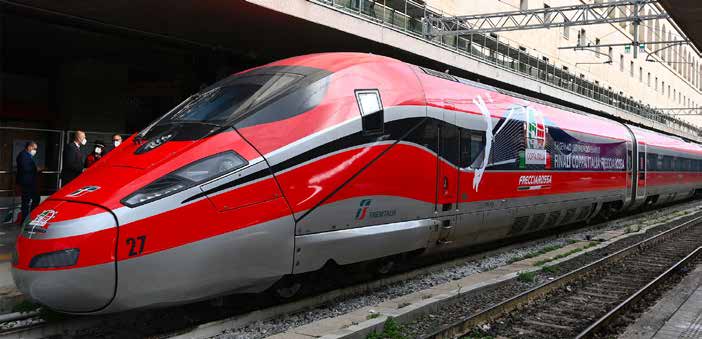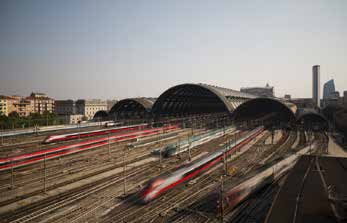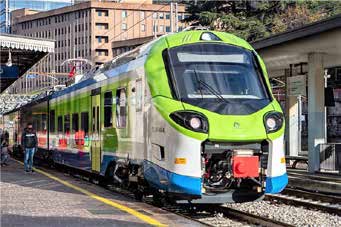Recently, FS Italiane announced the new strategy that will guide “a new way of running trains” from all points of view thanks to the implication of this new plan from its organisation to the investment value. The industrial plan that will be implemented until 2031 proposes a fundamental restructuring of what the group means today and brings to the forefront an investment of EUR 190 billion that aims to form a sustainable, energy-efficient, and interconnected transport system that meets the demands of freight and passenger mobility. The projects and programmes to be launched include not only rail but also road transport, but the focus will be on railways, which are able to minimise environmental impact and help promote efficient and environmentally friendly transport as the first choice for citizens and businesses to transport their goods.
by Pamela Luica
For FS Italiane, ongoing and newly launched strategies, projects and programmes focus on environmental protection and the building of a sustainable ecosystem that can provide services, infrastructure and facilities that together address mobility in the most efficient terms possible.
Since COP 21, when the Paris Agreement was announced, FS Group, along with many other rail and related industry companies, has been committed to reducing emissions from rail transport, which was also meant to drive growth in passenger and freight volumes. Under these circumstances, the group has focused its activities on reducing its environmental impact by setting 2030 and 2050 as deadlines leading to climate neutrality in three decades, with these targets applying to both the purchased energy segment and that produced by companies within the group and the use of fixed infrastructure such as stations, workshops, offices, tunnels, or roads. By 2050, the group intends to increase the modal shift process by encouraging public transport and shared mobility by 15%, motivating people not to use private cars, and on the freight segment, it wants 50% of the total volume to be transported by rail.
Thanks to the projects it has been able to implement, the group has succeeded in the last decade in influencing people to choose rail over individual road transport, leading to a reduction in CO2 emissions of 20 million tonnes. The programmes that have determined this about are the result of investments in the purchase of new trains, in particular the Frecciarossa 1000, which is 35% more energy-efficient than previous high-speed trains. The company has also acquired regional trains – the socalled Pop trains (produced by Alstom) and Rock trains (produced by Hitachi Rail Italy) – which consume more than 30% less energy than previous trains and are fully recyclable. In the freight segment, newer rolling stock – locomotives and carriages – have contributed to an increase in freight volumes because they are new, provide faster services and have high environmental performance.
Read the full article in Railway PRO Magazine – June edition
By replacing rolling stock and optimising the electricity mix, FS Italiane has managed to improve its emissions trend, even though there has been a general increase in energy consumption, reaching 2 million tonnes CO2 from 2.8 million tonnes in 2020. It is worth noting that in 2021 Trenitalia reported a 20.7% recovery in long-distance passenger volumes and in the regional transport network there was a 25.8% increase in passenger-kilometres with a 15% increase on train-kilometres compared to 2020. In 2020, due to the lockdown during 10 March – 3 May and the continuing restrictions imposed by the authorities to reduce the transmission of the virus, Trenitalia faced a decrease in passenger numbers of over 60%. Overall, FS Italiane has an 88% share of the passenger rail market, transporting 750 million passengers on more than 10,000 trains a day. The network managed by RFI encompasses 16,800 km of lines, of which over 700 km are high speed lines, and has a traffic of 21.5 billion passenger/km and 21.9 tonnes/km. Annually, the company transports over 45 million tonnes of freight.
Although the pandemic has taken its toll on rail traffic with an extremely negative effect on the economy, the group has been able to continue with its development investment projects. In 2021 the group recorded operating revenues of EUR 12.2 billion, 12.2% (EUR 1.3 billion) higher than the previous year, and technical investments amounted to EUR 12.5 billion, 40% higher than in 2020, of which 98% in Italy, and over EUR 10 billion in road and rail infrastructure projects.
Over 84% of capital expenditure was on infrastructure, with over EUR 8 billion invested through RFI, and 15.7% of investment went to the transport sector focusing on passenger rail and road projects both in Italy and internationally. Treniralia invested EUR 1.6 billion including routine maintenance services and Mercitalia EUR 136 million. Last year, the group awarded tenders totalling around EUR 26 billion. It should be noted that over EUR 25 billion is the amount allocated to FS Group subsidiaries through the National Recovery and Resilience Plan and the Complementary Fund under the Next Generation EU programme. RFI plays a key role in the Plan in particular through Mission 3 – on interventions on national and regional rail infrastructure, monitoring and digital surveillance of infrastructures and rail connections – receiving EUR 23.86 billion representing 11% of the total Italian NRRP.
Read the full article in Railway PRO Magazine – June edition
Share on:






